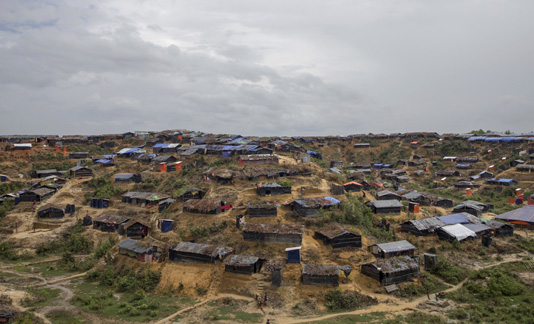Dhaka, Sept 23, 2018 (BSS) – If the repatriation of the Rohingyas, who have taken refuge in Bangladesh fleeing violence in Rakhine state of Myanmar, does not progress as swiftly as planned, it will intensify burden on the country’s economy, environment and society as well, experts believe.
“Urgent needs including food, healthcare, shelter, water and sanitation are being met with donor supports now. If the repatriation of Rohingyas takes more time, it would put pressure on economy, environment and society,” World Bank lead economist in Dhaka Dr Zahid Hossain told BSS.
Referring a recent report of the International Monetary Fund (IMF), he said if the donor support decreases, the burden of the Rohingyas will multiply on Bangladesh.
“To address the impacts of these costs, it is assumed that the authorities will meet these from domestic and external resources. Over the next six years, it is presumed that approximately Taka 440 billion (US$5.4 billion) will be raised domestically borrowed with a higher interest rate and a little over US$1 billion will be borrowed externally on non-concessional terms,” he added.
Additionally, he said, it is also expected that import growth will increase from 8 percent (baseline) to 9 percent to meet increased demands.
“Under the illustrative scenario, the debt sustainability outlook is affected by the worsening of the present value (PV) of public debt-to-GDP ratio and the external debt service ratios,” he added.
On the external side, Zahid Hossain said, the most important result is the deterioration and breach of the external debt service to revenue over the medium term.
The other external indicators also deteriorate but remain below their respective thresholds, he added.
On the public debt, he said, PV of public debt-to-GDP ratio deteriorates by almost 1.5 percentage points of GDP on average over the projection period.
The economist said this scenario strengthens the argument to create the fiscal space by implementing the value added tax (VAT) and the need for continued donor support from the international community to address the Rohingya crisis.
Senior Lecturer in Economics of the Bournemouth University in the UK Mehdi Chowdhury said the presence of the Rohingyas has imposed a heavy financial burden on the Bangladesh government.
During his recent visit to Rohingya camps, he said “One government officer told me that about 2,000 officials are involved in the management of the camps at various levels at an annual cost of $15.24 million to the Bangladesh government.”
This is a huge sum, considering the $1,700per capita annual GDP of Bangladesh, he added.
The economist said the local economy of the camps seems to be thriving and the Kutupalong site is full of small shops selling many kinds of goods.
“The sellers at shops are largely Rohingyas, though there is reportedly some Bangladeshi involvement, too,” he noted.
The Rohingya people of Myanmar are one of the most persecuted minorities in the world.
The Myanmar government doesn’t consider them as citizens and deprives them of basic rights such as education, healthcare, employment and freedom of movement.
To avoid persecution, waves of Rohingya people have taken refuge in neighbouring Bangladesh in recent decades, with particular flash points in 1978, 1992 and 2012.
The latest and largest mass exodus to Bangladesh took place in late August 2017. Within a month, around half a million Rohingya had fled to Bangladesh.
This influx gradually slowed down, but did not stop there. A year later, the total number of Rohingyas in Bangladesh is estimated to be 918,000, with around 700,000 new arrivals since August 2017.



